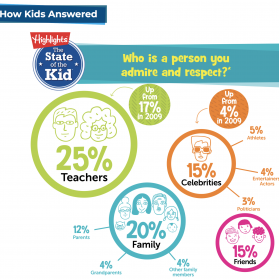
As young children, every experience contributes to who we become. We learn much on our own, through trial and error. But other learning comes from observing older children or adults. We watch how they treat others, how they act as spouses or parents, how they make decisions, and how those decisions turn out.
Children recognize role models, even if they don’t call them that. Highlights, the children’s educational magazine, recently released its 10th State of the Kid report, which revealed that when children were asked whom they admired, they most often said teachers.
As we grow and learn, we rely more and more on ourselves and less on others. But the need for role models never ends, especially when we take on leadership roles.
Last May, I wrote about how much I learned about leadership from my father, before and after I took over the firm. While he was my most important business role model, he couldn’t have anticipated every future challenge I would face. And so, over the years, I’ve often looked to others who could help me grow – including our advisory board, industry peers and clients.
In other words, role models aren’t just for up-and-comers; they’re also for those who have made it through the ranks. In a 2015 article for Harvard Business Review, researchers Suzanne de Janasz and Maury Peiperl noted that most CEOs have benefited from mentoring and other developmental activities early in their careers, but that those options narrow once they make it to the top. This, at the same time they must make decisions they have never had to make before.
When CEOs get good mentoring, often from former CEOs from other industries, good things happen, de Janasz and Peiperl say. In their study, they asked 45 CEOs participating in formal mentoring arrangements whether the arrangement had improved company results. Seventy-one percent said it had, and strong majorities said they were making better decisions and better achieving stakeholder expectations.
While de Janasz and Peiperl focused on CEO-to-CEO mentoring, we should never discount the value of role models who may never have led a company or brokered a merger. These are people who:
- Freely share knowledge and expertise that we don’t have
- Are willing both to lead and to learn
- Are able to connect and communicate with a diverse set of people
- Can influence others through a collaborative approach
- Are committed both to their companies and to their communities
It’s clear that the most effective role models aren’t those whom we admire from afar (sorry, LeBron). Instead, they are those with whom we form personal or professional relationships. Not all of us will fully acquire the traits we most admire in our role models, but just as part of every business plan is aspirational, our growth as leaders begins with aspiration. Work at it long enough, and we may even become role models ourselves.
Sandra Harbrecht Ratchford
President and CEO
Paul Werth Associates
*Even though the question asked them to exclude members of their family when answering, kids still mentioned family members in their answer.
Highlights.com
Copyright 2018 Highlights for Children, Inc. All Rights Reserved
Due to the open-ended structure of the survey questions, all answers may not add up to 100%.